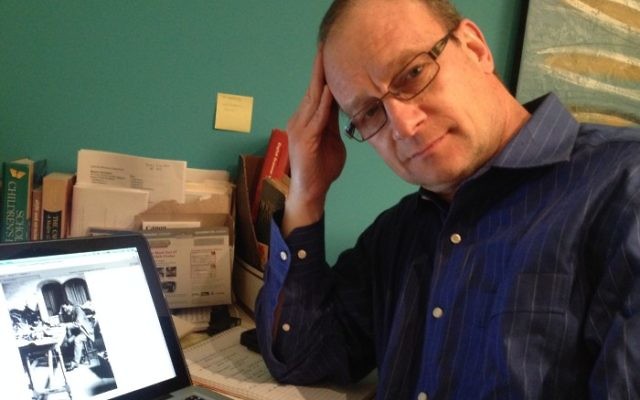Watching for That Slippery Slope
The latest wave of book-banning reminds Dave of his father’s friend, author Alvin Schwartz.
Dave Schechter is a veteran journalist whose career includes writing and producing reports from Israel and elsewhere in the Middle East.
Whenever I read about people wanting to ban books, I think of Alvin Schwartz.
Schwartz was a friend of my father. They were camp counselors together in New Hampshire and when my parents married, Schwartz and another friend hitchhiked half-way across the country to Des Moines for the wedding.
Schwartz’s “Scary Stories to Tell in the Dark” and “Scary Stories” trio (artwork by Stephen Gammell) topped the American Library Association’s list of the 100 most challenged books of the 1990s. Critics denounced the reimagined folklore as being too scary and violent, and of dabbling in the occult and witchcraft. The books ranked 7th on the ALA’s 2000-2009 list and 24th for 2010-2019.
One of Schwartz’s daughters, Betsy Johnson, last October told Smithsonian Magazine: “My dad was very proud of that. It meant the books were relevant. People were paying attention. It was great publicity. He used to joke, ‘When I die, I want my New York Times obituary to say I had some of the most banned books in America.’” Schwartz died in 1992.
I once asked Barbara Schwartz what she thought about her late husband’s books being banned. The more they ban, the better the sales and the royalty checks, she said.
The chronic fever over what middle- and high-school students are being taught or can access from public school libraries is spiking again.
The McMinn (Tennessee) County board of education voted 10-0 to remove “Maus,” Art Spiegelman’s Pulitzer Prize-winning graphic novel on the Holocaust, from an eighth-grade language arts curriculum. In “Maus,” Jews are depicted as mice, Germans as cats and other peoples in various animal forms. Board members objected to the book’s language and an image of a naked woman — er, mouse — who committed suicide.
The U.S. Holocaust Memorial Museum considers “The Diary of Anne Frank” as appropriate beginning in 6th grade, “Maus” in 8th grade and Elie Wiesel’s “Night,” a haunting work, in 9th grade.
Barbara Schwartz, who died last year, was right. As this was written, “Maus” topped Amazon’s list of best-selling biographies and history graphic novels, despite being “temporarily out of stock.”
The school board in a Seattle suburb voted unanimously to remove Harper Lee’s frequently-challenged 1960 novel “To Kill a Mockingbird” from a 9th grade required reading list, citing objections to its use of a particular word and depictions of Southern racial attitudes. Teachers retained the option of assigning the book.
The Granbury (Texas) Independent School District, which removed 125 books from library shelves, received a scolding from a high school junior. “No government — and public school is an extension of government — has ever banned books and banned information from its public, and been remembered in history as the good guys,” she told the district’s board.
A bill before the Georgia Senate would require local school boards to create a complaint process about “harmful” material being provided to minors. The criteria include being “patently offensive to prevailing standards in the adult community as a whole with respect to what is suitable material for minors” or “taken as a whole, lacking in serious literary, artistic, political, or scientific value for minors.”
How do you determine the “prevailing standards” in a diverse society? How do you judge the “literary, artistic, political, or scientific value for minors”?
“I know it when I see it,” the standard suggested by Associate Justice Potter Stewart in a 1964 obscenity case before the U.S. Supreme Court, seems insufficient to the task.
Schwartz’s daughter, who, perhaps ironically, is a librarian in the children’s room of a public library, said, “My father was a former journalist, a big First Amendment supporter. I think he was offended by the notion that parents thought they had the right to tell kids, who he thought had a lot of agency, what they could read.”
Adults who weigh the risks inherent in permitting access to books on sensitive and controversial topics also should be mindful of history’s excesses.
The students who burned 25,000 “un-German” books in Berlin’s Opera Square on May 10, 1933, upheld the prevailing standards in that time and place as they “sought to purify German literature of ‘foreign,’ especially Jewish, and other immoral influences,” according to the U.S. Holocaust Memorial Museum.
Before I am pilloried, I am not suggesting that today’s events will lead to yesterday’s outcomes. Still, if anyone knows to keep a wary eye out for a slippery slope, it would be “the people of the book.”




comments